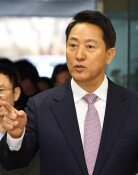Native-Speaking English Teachers Wanted
Native-Speaking English Teachers Wanted
Posted February. 03, 2006 03:04,
Students from 19 schools in townships in Sunchang County in Jeonbuk Province dont get the chance to speak to a native-speaking English teacher all year.
There is only one native-speaking English teacher in the county: a second generation Korean-American who has been busy teaching in six out of 25 elementary, middle and high schools in the county since last September. We want to learn English from an American teacher, too, students in townships say. But it seems that their dream will probably not be realized until two or three years later.
Danyang County is a remote area in Chungbuk Province with about 1,000 students in seven middle schools. But there is only one English native teacher, David Baker, a 54-year-old American teacher who has been teaching for three years, among them.
He divides the middle schools into two groups and teaches one group a semester. For students, it is not just about learning English from a native speaker, but just seeing him several times a year.
Baker can only go to three elementary schools in town out of eleven schools. Teaching 22 hours a week and circulating between schools, he is always tired.
A native English teacher allocated in Jecheon just disappeared less than six months after he started working.
Worsening English Divide Among Regions-
The Ministry of Education and Human Resources Development released a five-year plan to vitalize English education last year. The plan calls for allocating at least one native English speaker to each of the 2,850 middle schools across the country by 2010.
There are 221 native English speakers in the Korean education system. Officials of education bureaus in the field say, It costs 35 to 45 million won annually to hire a native-speaking teacher. The governments demand that regional education bureaus pay the entire amount actually makes it nearly impossible to hire such teachers.
The Education Bureau of Jeonbuk Province had planned to increase the number of native English teachers from 25 to 50 this year, but actually added the cost of hiring just one more teacher to its budget.
Kim Hak-san, the vice principal of Jeonju High School, said, While a survey says that 60 percent of students in Seoul learned English from a foreigner before the age of 10, it is hard to meet a native speaker even in a private institute in rural communities.
The English Divide, meaning the gap in parent wealth that leads to gaps in childrens English ability and wealth, is being created between regions.
Native Speakers Are Concentrated in Seoul-
Native English speakers prefer the Seoul Metropolitan area, which includes Seoul, Gyeonggi and Incheon, and large cities like Busan and Jeju Island. Smaller numbers of native speakers want to teach in small- to medium-sized cities and rural communities because of inferior living conditions, including housing, and the foreignness of Korean rural culture. Rural communities in Gyeongnam, Gyeongbuk, Jeonnam, Jeonbuk and Chungbuk are some of the areas native speakers avoid.
Most native teachers allocated to rural communities are newcomers who are visiting Korea for the first time in their lives and do not know the country well. It is very rare for them to extend their contract in the same region after working there for a year.
Choi Jae-seung, a school inspector at the Danyang education bureau in Chungbuk, said, Native teachers try to avoid working in rural communities because there are no leisure facilities to spend time in after classes are over, adding, It is extremely difficult to find a teacher.
Both Regional Authorities And the Government Should Pay Attention-
Recently, there are increasing numbers of local governments that manage English villages, including Gyeonggi Province, Suncheon in Jeonnam Province and Jeonju in Jeonbuk Province.
With native teachers shunning work in those areas, the Jeonnam education bureau does not participate in the allocation by the Ministry of Education and Human Resources Development. Instead, it selects well-qualified teachers from Canada by visiting it once a year.
The Jeonbuk education bureau builds a human network centering on U.S. troops living in the area or foreigners who got married to Koreans, and utilizes them in the form of volunteers. Also, it arranged to have English majors from Australian universities teach in the Jeonbuk area.
Kim Hyo-soon, a school inspector for the education bureau of Jeonbuk Province, said, In an attempt to vitalize education in rural communities, the government should allocate native teachers in marginalized areas in English education and support the budget from the national treasury.







